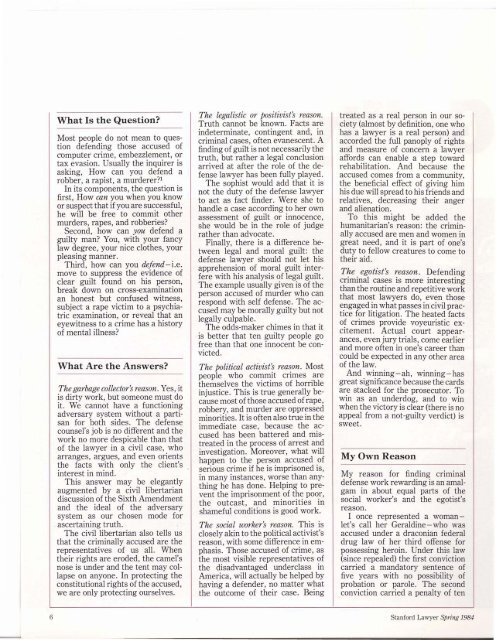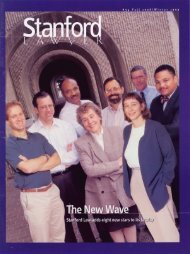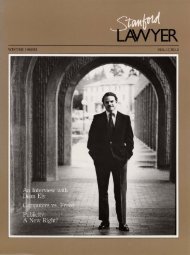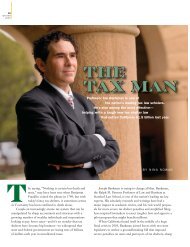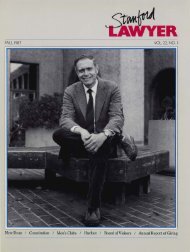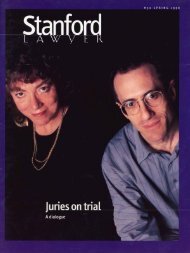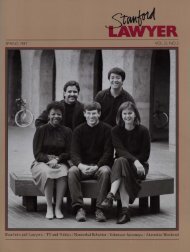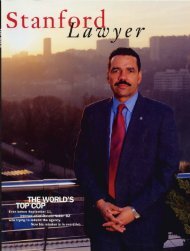Spring 1984 – Issue 31 - Stanford Lawyer - Stanford University
Spring 1984 – Issue 31 - Stanford Lawyer - Stanford University
Spring 1984 – Issue 31 - Stanford Lawyer - Stanford University
- No tags were found...
Create successful ePaper yourself
Turn your PDF publications into a flip-book with our unique Google optimized e-Paper software.
What Is the Question?Most people do not mean to questiondefending those accused ofcomputer crime, embezzlement, ortax evasion. Usually the inquirer isasking, How can you defend arobber, a rapist, a murderer?1In its components, the question isfirst, How can you when you knowor suspect that if you are successful,he will be free to commit othermurders, rapes, and robberies?Second, how can you defend aguilty man? You, with your fancylaw degree, your nice clothes, yourpleasing manner.Third, how can you defend- i.e.move to suppress the evidence ofclear guilt found on his person,break down on cross-examinationan honest but confused witness,subject a rape victim to a psychiatricexamination, or reveal that aneyewitness to a crime has a historyof mental illness?What Are the Answers?The garbage collector's reason. Yes, itis dirty work, but someone must doit. We cannot have a functioningadversary system without a partisanfor both sides. The defensecounsel's job is no different and thework no more despicable than thatof the lawyer in a civil case, whoarranges, argues, and even orientsthe facts with only the client's ,interest in mind.This answer may be elegantlyaugmented by a civil libertariandiscussion of the Sixth Amendmentand the ideal of the adversarysystem as our chosen mode for,ascertaining truth.The civil libertarian also tells usthat the criminally accused are therepresentatives of us all. Whentheir rights are eroded, the camel'snose is under and the tent may collapseon anyone. In protecting theconstitutional rights of the accused,we are only protecting ourselves.The legalistic or positivist's reason.Truth cannot be known. Facts areindeterminate, contingent and, incriminal cases, often evanescent. Afinding of guilt is not necessarily thetruth, but rather a legal conclusionarrived at after the role of the defenselawyer has been fully played.The sophist would add that it isnot the duty of the defense lawyerto act as fact finder. Were she tohandle a case according to her ownassessment of guilt or innocence,she would be in the role of judgerather than advocate.Finally, there is a difference betweenlegal and moral guilt: thedefense lawyer should not let hisapprehension of moral guilt interferewith his analysis of legal guilt.The example usually given is of theperson accused of murder who canrespond with self defense. The accusedmay be morally guilty but notlegally culpable.The odds-maker chimes in that itis better that ten guilty people gofree than that one innocent be convicted.The political activist's reason. Mostpeople who commit crimes arethemselves the victims of horribleinjustice. This is true generally becausemost of those accused of rape,robbery, and murder are oppressedminorities. It is often also true in theimmediate case, because the accusedhas been battered and mistreatedin the process of arrest andinvestigation. Moreover, what willhappen to the person accused ofserious crime if he is imprisoned is,in many instances, worse than anythinghe has done. Helping to preventthe imprisonment of the poor,the outcast, and minorities inshameful conditions is good work.The social worker's reason. This isclosely akin to the political activist'sreason, with some difference in emphasis.Those accused of crime, asthe most visible representatives ofthe disadvantaged underclass inAmerica, will actually be helped byhaving a defender, no matter whatthe outcome of their case. Beingtreated as a real person in our society(almost by definition, one whohas a lawyer is a real person) andaccorded the full panoply of rightsand measure of concern a lawyeraffords can enable a step towardrehabilitation. And because theaccused comes from a community,the beneficial effect of giving himhis due will spread to his friends andrelatives, decreasing their angerand alienation.To this might be added thehumanitarian's reason: the criminallyaccused are men and women ingreat need, and it is part of one'sduty to fellow creatures to come totheir aid.The egotist's reason. Defendingcriminal cases is more interestingthan the routine and repetitive workthat most lawyers do, even thoseengaged in what passes in civil practicefor litigation. The heated factsof crimes provide voyeuristic excitement.Actual court appearances,even jury trials, come earlierand more often in one's career thancould be expected in any other areaof the law.And winning-ah, winning-hasgreat significance because the cardsare stacked for the prosecutor. Towin as an underdog, and to winwhen the victory is clear (there is noappeal from a not-guilty verdict) issweet.My Own ReasonMy reason for finding criminaldefense work rewarding is an amalgamin about equal parts of thesocial worker's and the egotist'sreason.I once represented a womanlet'scall her Geraldine-who wasaccused under a draconian federaldrug law of her third offense forpossessing heroin. Under this law(since repealed) the first convictioncarried a mandatory sentence offive years with no possibility ofprobation or parole. The secondconviction carried a penalty of ten6<strong>Stanford</strong> <strong>Lawyer</strong> <strong>Spring</strong> <strong>1984</strong>


